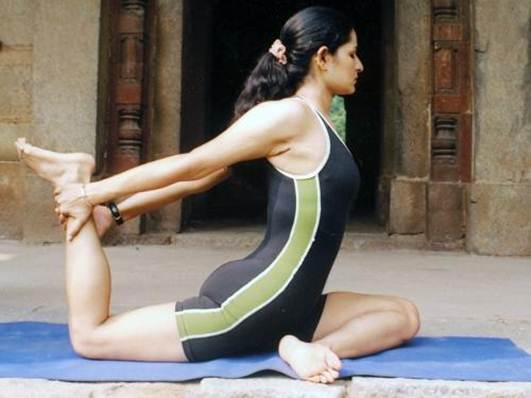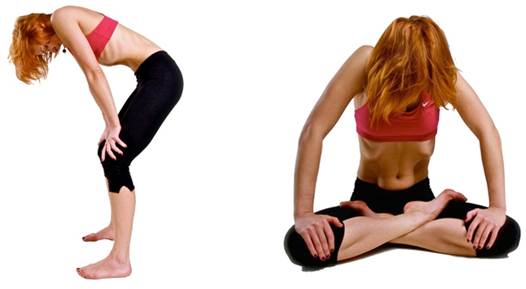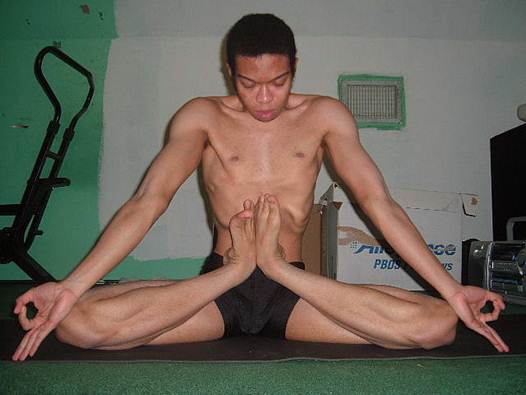Stave off muscle loss
Weight training combined with yoga practice
can also be a great way to maintain strength as you age. Countless studies show
that a lack of exercise can lead to muscle mass decline beginning at age 40. If
you stay sedentary, by the age of 70 you could lose about 30 percent of your
muscle mass. Lifting weight two to three times per week builds muscle and
although doing yoga regularly can bring similar benefits, it’s important to
introduce your body to new challenges from time to time to avoid hitting a
plateau.

As Ippoliti can attest, adding just a
little bit of weight training to your routine will give you extra oomph in your
poses, especially if you are naturally flexible and struggle to build strength.
“I started to feel extra-powerful in my Chaturangas, and my stamina in standing
poses improved,” she says. She also noticed, for the first time, that her
hamstrings were weak. All of these factors renewed her motivation to do poses
she’d stopped doing and got her out of some of her own hem-practice ruts.
If the idea of going to the gym sounds
torturously boring, or of you feel like you’re cheating on your yoga practice,
you can try Forbes’s approach by bringing aspects of your yoga practice into
the weight room. Conscious Ujjayi Pranayama (Victorious Breath) is her No.1
focus. “I integrate the principles of vinyasa into weightlifting,” she says.
“There’s a time to inhale and a time to exhale. If you’re doing a biceps curl,
you inhale to prepare; then you exhale as you curl your arm toward you. Take
another breath in, and then exhale again as you lower your arm slowly.” Along
with breathwork, Forbes teaches two of the bandhas, or locks – Uddiyana Bandha
(Upward Abdominal Lock) and Mula Bandha (Root Lock) – to help awaken the deep
core muscles so that thay can support the spine. She started incorporating this
subtle abdominal work in the weight room after noticing that many weight room
after noticing that many weightlifters work on the superficial muscles of the
back and abdominals, which can tax the back in the long run. (If you’re never
done the locks, it’s easiest to start with Uddiyana. For a more detailed
breakdown of how to do it, see “Going Up”.) Finally, Forbes encourages her
students to bring all of their knowledge about bodily alignment with them when
they lift weights. Ippoliti agrees that the body awareness that yogis bring to
the table helps them at the gym. “Your body awareness as a yogi is really going
to be an asset in how you progress,” she says.

Uddiyana
Bandha (Upward Abdominal Lock)
Ippoliti still hits the gym regularly with
her personal trainer because she believes that weight training keeps her body
in balance and enhances her yoga practice. She points out that, these days,
yoga is being mixes with all sorts of disciplines, from hooping to golf to
music and dance. From her point of view, these are all ways that yoga is
evolving and remaining relevant to what’s happening in the world around us. She
brings up the point that 5,000 years ago, yogis didn’t sit at computers all day
long. In her mind, if there’s a way to address that type of modern physical
challenge efficiently and to ensure you’re bot bringing bad postural habits to
the yoga mat, then what’s to argue about? “We’re cross-pollinating these
disciplines. Why not? It adds so much flavor and goodness to the whole
practice,” she says. “For me, it’s about how you can find an alignment between
staying true to the tradition of yoga while being open and flexible to trying
other avenues that can help you improve and evolve.”
Going up

Uddiyana Bandha (Upward Abdominal Lock) is
often taught as the action of taking the “navel to the spine.” The secret to
true Uddiyana Bandha, however, is found in its name, which translates from
Sanskrit as “upward flying seal, or lift.”
To create this upward flying seal, place
your hands on your lower abdomen, palm over palm. Draw your public bone up
toward your heart. (This action will also tuck your tailbone, but initiating it
from the public bone will help engage your deep, intrinsic abdominal muscles.)
Begin Ujjayi breath, inhaling and exhaling for several rounds. The diaphragm
lifts when you exhale, making more space for Uddiyana Bandha to engage more
strongly. With each successive exhalation, draw your deep, intrinsic abdominals
toward your deep spine a little, but mostly up toward the ceiling, creating the
“upward flying” action.
Now, we’ll add a rhythmic interplay, or
vinyasa, between Uddiyana Bandha and the breath. As you inhale, keep about 30
percent of Uddiyana Bandha; as you exhale, engage it about 90 percent, and draw
those muscles up toward your lower ribs.
Each time you exhale while lifting weights,
engage Uddiyana Bandha strongly to support your spine. You’ll build strength
faster and with more integrity, and you’ll protect yourself from the most
common weightlifter’s ailment: lower-back pain and injury.